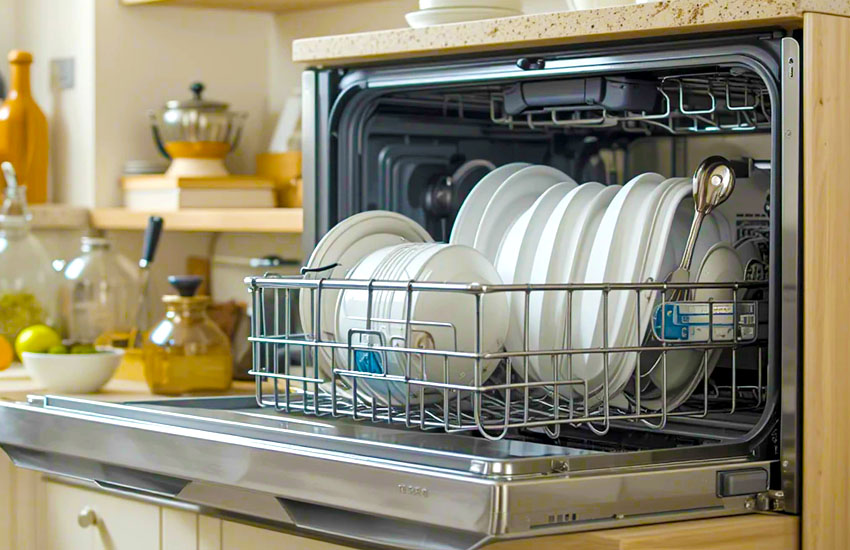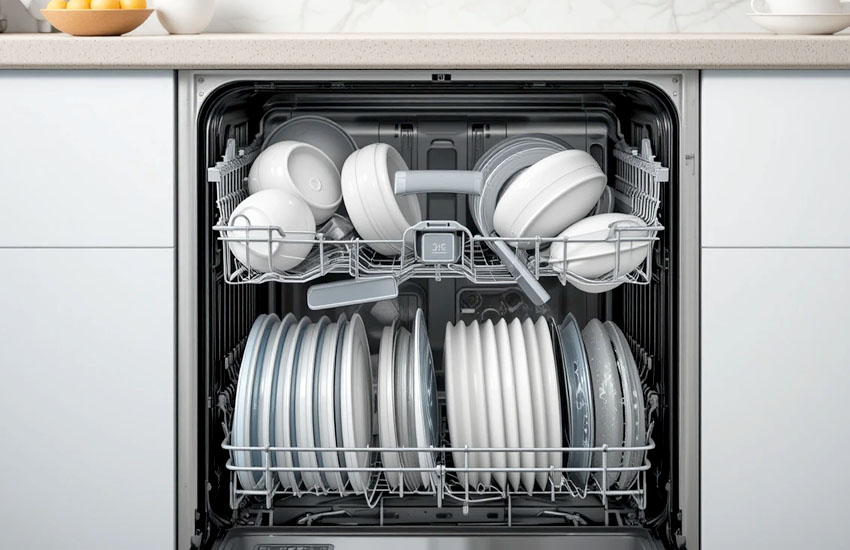As an Amazon Associate, I earn from qualifying purchases at no extra cost to you.
7 Common Dishwasher Problems and How to Fix Them
You rely on your dishwasher to make life easier, right? But when it starts acting up, it can be a real headache. Don’t worry! In this blog, we’ll dive into 7 common dishwasher problems and simple ways to fix them. From leaks to clogs, we’ve got you covered—so let’s get your dishwasher back on track!

1. Dishwasher Not Cleaning Properly
Why Aren’t My Dishes Coming Out Clean?
One of the most frustrating problems is when your dishwasher runs, but your dishes are still dirty or covered in residue. This could be caused by several issues. Over time, food particles, grease, and minerals can clog the spray arms, reducing water pressure and preventing a thorough cleaning. If the water temperature is too low, grease and grime may not break down properly. Additionally, a dirty or clogged filter can trap food particles, spreading them across your dishes during the cycle.
How to Fix It
Start by cleaning the spray arms. Most dishwashers have removable spray arms at the bottom and sometimes at the top. Take them out and rinse them under warm water, using a brush to clear out debris from the holes. Next, check your water heater settings—dishwashers need water that’s at least 120°F (49°C) to clean effectively. If the temperature is too low, adjust your water heater. Finally, remove and clean the dishwasher filter. Depending on the model, the filter may be a flat mesh or a cylindrical piece at the bottom of the tub. Wash it thoroughly and remove any gunk. Regular cleaning of these parts can prevent future problems.
2. Dishwasher Won’t Start
Why Won’t My Dishwasher Turn On?
It’s annoying when your dishwasher refuses to start, especially when you’ve already loaded it with dirty dishes. The problem could be as simple as a power issue or as complex as a faulty control panel. If the dishwasher isn’t plugged in properly, it won’t get power. Sometimes, a tripped circuit breaker can cut power to the appliance. Another common cause is a faulty door latch or door switch. Dishwashers are designed not to run unless the door is securely closed. If the latch is broken or the switch isn’t signaling the control panel, the dishwasher won’t start.
How to Fix It
First, check that the dishwasher is plugged in securely and that the outlet is functioning. If the dishwasher still doesn’t turn on, inspect your home’s circuit breaker panel to see if the breaker for the dishwasher has tripped. Reset it if necessary. Next, examine the door latch and switch. If the door doesn’t click securely when you close it, the latch may be broken and will need replacement. You can test the door switch using a multimeter to see if it’s functioning properly. If none of these steps work, the issue may lie with the control panel or wiring, and it might be time to call a professional.
3. Dishwasher Not Draining
Why Is There Water Sitting in the Bottom of My Dishwasher?
Pooling water at the bottom of your dishwasher is a common issue and usually points to a drainage problem. This could happen because of a clogged drain hose, a blocked filter, or a problem with the drain pump. Over time, food particles and grease can build up in the drain hose or filter, restricting water flow. Sometimes, the issue lies with the garbage disposal connection if your dishwasher’s drain hose is attached to it.
How to Fix It
Start by cleaning the dishwasher filter. Remove it and rinse it under warm water, scrubbing away any debris. Then, check the drain hose for blockages. Disconnect the hose from the dishwasher and sink, and use a long brush or a coat hanger to clear out any clogs. If your dishwasher is connected to a garbage disposal, make sure the knockout plug in the disposal has been removed. Finally, inspect the drain pump, located at the bottom of the dishwasher, for obstructions. If the pump is faulty, it may need replacement. Regular maintenance can help keep your dishwasher draining smoothly.
4. Dishwasher Leaking Water
Why Is My Dishwasher Leaking All Over the Floor?
A leaking dishwasher can cause significant water damage to your kitchen floor if not addressed promptly. Leaks are often caused by damaged door seals, loose or cracked hoses, or overloading the dishwasher. The rubber door gasket creates a watertight seal during operation, but if it’s worn out or cracked, water can escape. Additionally, a loose or damaged hose connection can lead to leaks underneath the unit. Overloading the dishwasher with too many dishes can also cause water to splash out.
How to Fix It
Begin by inspecting the door gasket for wear and tear. If you notice cracks or gaps, replace the gasket with a new one, which is usually an inexpensive fix. Next, check the hoses connected to the dishwasher, both the drain hose and the water supply line. Tighten any loose connections and replace any hoses that show signs of wear. Make sure you’re not overloading the dishwasher, as this can disrupt water flow and lead to leaks. If the problem persists, inspect the float assembly and inlet valve to ensure they’re functioning properly.
5. Dishwasher Smells Bad
Why Does My Dishwasher Smell Like Rotten Food?
A smelly dishwasher can make your entire kitchen unpleasant. This issue is usually caused by food particles trapped in the filter, spray arms, or drain hose. Over time, these particles can rot and produce a foul odor. Hard water buildup can also contribute to the smell, especially if it creates a breeding ground for mold and mildew.
How to Fix It
Start by cleaning the dishwasher filter. Remove it and scrub away any food debris or grease. Next, check the spray arms and drain hose for trapped particles, and clean them thoroughly. Run an empty cycle with a dishwasher-safe cleaner or a mixture of white vinegar and baking soda to remove odors and mineral buildup. To prevent future smells, scrape food off plates before loading them into the dishwasher and clean the filter regularly.
6. Dishwasher Making Loud Noise
Why Is My Dishwasher So Noisy?
Dishwashers should run quietly in the background, so loud banging, grinding, or rattling noises can be alarming. These noises are often caused by loose parts, a faulty motor, or debris in the spray arms. If a utensil or dish is blocking the spray arms, it can cause them to hit against other parts of the dishwasher. Worn-out bearings or a malfunctioning pump can also lead to unusual sounds.
How to Fix It
Start by inspecting the spray arms to ensure they’re not hitting any dishes or utensils. Rearrange your dishes if necessary to prevent obstructions. Check for any loose screws or parts inside the dishwasher and tighten them as needed. If the noise persists, the issue might be with the motor or pump. In this case, you may need to replace the faulty component or call a technician for help.
7. Dishwasher Not Drying Dishes
Why Are My Dishes Still Wet After a Cycle?
If your dishwasher isn’t drying dishes properly, it could be due to a malfunctioning heating element, improper loading, or lack of rinse aid. The heating element is responsible for generating the heat needed to dry your dishes. If it’s damaged, the dishwasher won’t dry effectively. Additionally, overloading or placing items in the wrong positions can block airflow, leaving dishes wet.
How to Fix It
First, check the heating element at the bottom of the dishwasher. If it’s visibly damaged or not working, replace it with a new one. Make sure you’re loading the dishwasher correctly, with enough space between dishes to allow proper airflow. Use a rinse aid to improve drying performance, as it helps water sheet off dishes more effectively. If these steps don’t resolve the issue, consult your dishwasher’s manual or contact a professional for further assistance.

Are These Questions in Your Mind?
When it comes to dishwashers, you might have additional concerns. Here are answers to some frequently asked questions that weren’t covered in the main sections.
Is it safe to run my dishwasher overnight?
Running your dishwasher overnight can be safe, but only if the appliance is in good working condition. Make sure there are no leaks or electrical issues before leaving it unattended.
Can I use regular dish soap in my dishwasher?
No, you should never use regular dish soap in your dishwasher. It creates excessive suds, which can overflow and damage the appliance. Always use detergent specifically designed for dishwashers.
Do I need to pre-rinse dishes before loading them?
In most cases, no. Modern dishwashers are designed to handle food particles. Just scrape off large food scraps to prevent clogs.
Is it normal for my dishwasher to make some noise?
Yes, some noise is normal, especially during the spray and drain cycles. However, loud banging or grinding noises may indicate a problem with the motor or spray arms.
Can I clean my dishwasher with vinegar?
Yes, running an empty cycle with a cup of white vinegar on the top rack is an effective way to clean your dishwasher and remove odors.
Do I need to replace the dishwasher’s gasket?
You should replace the gasket if it’s cracked, torn, or no longer seals the door properly. A damaged gasket can cause leaks.
Is it okay to wash plastic items in the dishwasher?
Yes, but make sure they are dishwasher-safe and place them on the top rack to avoid melting or warping from the heating element.
Can I fix a broken spray arm myself?
Yes, replacing a spray arm is a relatively simple DIY repair. You can usually unscrew or snap off the old arm and attach a new one.
Do I need to clean the drain hose regularly?
Yes, cleaning the drain hose occasionally can prevent clogs and ensure smooth drainage. Disconnect it carefully and flush it out with water.
Is it worth repairing an old dishwasher?
It depends on the cost of repairs versus replacement. If the repair costs are close to the price of a new unit and your dishwasher is over 8-10 years old, consider replacing it.
I hope this guide has helped you better understand and troubleshoot your dishwasher problems. With a little effort and know-how, you can keep your dishwasher running smoothly and avoid unnecessary repairs. If you still have concerns or run into complicated issues, don’t hesitate to call a professional for assistance!